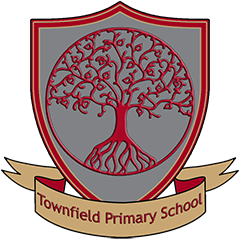Science
WELCOME TO SCIENCE AT TOWNFIELD
Science
The Science curriculum offer follows the national curriculum in KS1 and KS2 and the EYFS Statutory Framework and Development Matters in the early years. The Science curriculum is ambitious and designed to give all learners, particularly the most disadvantaged and those with special educational needs, the knowledge and cultural capital they need to succeed in life. Where required, pedagogy is adapted so that all pupils including disadvantaged pupils and those with SEND are on the same knowledge journey towards the same endpoints.
Our curriculum is carefully weighted with equal priority given to both substantive knowledge (Scientific facts explaining how the world works) and disciplinary knowledge (how scientists work and come to their conclusions). Clearly defined substantive knowledge end points are identified at the end of the unit and disciplinary knowledge end points at the end of each key stage. Components (building blocks) are carefully sequenced so new knowledge builds on what has been previously taught and leads to the end points. Where required pedagogy is adapted so that all pupils including disadvantaged pupils and those with SEND are on the same knowledge journey towards the same endpoints.
Key concepts for example 'animals including humans', 'materials' and 'plants' are covered and repeated throughout the curriculum. Vocabulary is also taught explicitly in every lesson. Key words and concepts are mapped out and there are also opportunities for developing reading in science.
Across school, plans are written following the end points and key concepts.
Review and retrieval is a key part of every lesson. Quick quizzes and knowledge organisers are used to support this.
Our pupils represent an urban area of Wirral and this is reflected through an inclusive, diverse curriculum which is supported through additional extra-curricular focuses on events such as Science Week and visits from professional scientists.
For further information on our curriculum intent, implementation and impact, please see our curriculum page.
Townfield Primary School has been awarded the Primary Science Quality Mark. The Primary Science Quality Mark is is a year-long programme that helps schools to achieve a quality mark that focuses on developing effective, confident science leadership for whole school impact on science teaching and learning. Whilst we are very proud of this award, this is only the beginning of our journey in delivering quality science across school and we will continue to look at ways in which we can ensure children recieve a high quality science provision.

Please see below the Science Curriculum Overview for KS1 and 2
The Science curriculum is set out in the Science End Points document.
AUTUMN TERM
Nursery
Autumn 1
Children will:
Begin to make simple observations and create simple drawings.
Explore the environment with the 5 senses.
Autumn 2
Children will:
- Know vocabulary associated with shadows, e.g. light, dark, longer, shorter, sun, torch, block and shine.
- Make simple observations.
- Know how to choose resources needed to explore.
Reception
In Autumn Term, pupils will learn:
- How to choose resources needed to explore
- How to make observations
- How to explore how things work and how things change

Woodland Learning
Year 1
Autumn 1
Seasonal Changes
- Know the names of the seasons in order
- Know changes that occur across the seasons
- Know how weather patterns & hours of daylight across the seasons change
Autumn 2
Animals including Humans
- Know keycharacteristics of a range of animals: fish, amphibians,reptiles, birds, mammals (inc. pets)
- Know the diets of carnivores, herbivores and omnivores
- Know key parts of the human body and the sensory role of specific parts

Woodland Learning
Year 2
Autumn 1 and 2
Habitats
- Know the terms ‘living’, ‘non-living’ &‘dead’
- Know how habitats vary and how specific animals and plants are suited to specific ones
- Know the meaning of the term microhabitat
- Know an example of a simple food chain


Woodland Learning
Year 3
Autumn 1
Light
- Know that light is needed to see things and that dark is the absence of light
- Know that some materials reflect more light than others
- Know that the light from the sun can damage eyes
- Know why shadows form and why they can vary in size and direction
Autumn 2
Forces and Magnets
- Know that things move differently on different surfaces
- Know examples of contact and non-contact forces
- Know why magnets attract or repel materials and give examples
- Know why magnets attract and repel each other

Year 4
Autumn 1
Materials: States of Matter
- Know why substances are classified as solids, liquids or gases
- Know how temperature can affect a material’s state
- Know how evaporation and condensation form a part of the water cycle
Autumn 2
Sound
- Know the link between vibrations and sound
- Know how the pitch and volume of a sound can be altered
- Know what happens when sound passes through different mediums to the ear
Year 5
Autumn 1
Forces
- Know the effect of gravity on unsupported objects
- Know how friction, inc. air resistance & water resistance, acts between moving surfacesKnow that pulleys, levers and gears enable a smaller force to have a greater effect
Autumn 2
Earth and Space
- Know how planets in the solar system move around the sun
- Know how the moon moves in relation to Earth
- Know why Earth’s rotation is the cause of day and night.


Year 6
Autumn 1
Electricity.
- Know how voltage affects the loudness of a buzzer and/or brightness of a bul
- Know how volume and/or brightness are affected by the use of different component
- Know how conventional symbols are used on a circuit diagram
Autumn 2
Light
- Know that light travels in straight lines
- Know that we see a light source, or an object that light shines upon, because light shines from the source or object into our eyes
- Know why a shadow forms the same shape as the object that casts it.


SPRING TERM
Year 1
Spring 1 and 2
Materials
- Know different types of everyday materials e.g. wood, plastic, glass, metal, water, rock
- Know properties of everyday materials
- Know the difference between an object and the material it is made from
Year 2
Spring 1
Materials
- Know how everyday materials are suited to different uses
- Know how the shape of some solid objects can be changed by squashing, bending, twisting & stretching
Spring 2
Animals including humans
- Know that animals produce offspring that grow into adults
- Know that animals need food, water and air to survive
- Know the importance of diet, exercise & hygiene for humans
Year 3
Spring 1
Rocks and Fossils
- Know that rocks differ in their appearance and properties
- Know the process of fossilisation for animals and plants
- Know that soil is made from rocks and organic matter, with these factors producing different types of soil
Spring 2
Light
- Know that animals & humans get nutrition from the food they eat
- Know the importance of a balanced diet for health & survival
- Know that skeletons and muscles within different animals aid support, movement and protection
Year 4
Spring 1
Electricity
- Know electrical safety hazards
- Know common conductors and insulators
- Know how to create a simple circuit: bulb/lamp, cell, wire
- Know why a bulb may not light e.g. switch, broken circuit
Spring 2
Animals including humans
- Know the functions of body parts linked to the digestive system: mouth, oesophagus, stomach, small and large intestine, and anus
- Know different types of teeth and describe their functions: incisors, canines, molars
- Know how to construct food chain diagrams that identify producers, consumers, predators and prey
Year 5
Spring 1 and 2
Materials
- Know properties of a range of materials: e.g. hardness, solubility, transparency, conductivity, magnetism
- Know how tests can be used to select materials for everyday use
- Know how mixtures and solutions can be separated by filtering, sieving and evaporating
- Know how to explain reversible and non-reversible changes
Year 6
Spring 1
Evolution and Inheritance
- Know that fossils provide evidence of changes to living things over time
- Know that living things produce offspring of the same kind that aren’t usually identical to their parentsKnow examples of adaptation and evolution aiding survival in an environment
Spring 2
Animls including Humans
- Know the names and functions of the main parts of the human circulatory system (heart, blood vessels and blood)
- Know the impact of diet, exercise, drugs & lifestyle on the healthy functions of the human body
- Know ways that nutrients and water are transported within the human body

SUMMER 1
Nursery
This term the children in our nursey classes have had lots of fun exploring many different aspects of science. They had loved creating a wormery and learning about different mini beasts. They have alsoenjoyed exploring static electricty by using ballons.
Reception
Science
In Reception the children have been planting cress seeds, making observational drawings of plants, sorting animals by habitat and observing butterflies.






Year 1
Summer 1 and 2
Plants
- Know specific typesof plants and trees from the following groups: garden flower, wildflower, deciduous tree and evergreen tree e.g. rose, dandelion, oak, conifer
- Know the difference between deciduous and evergreen plantsKnow the basic parts of flowering plants and trees: roots, stem, trunk, leaves, flowers, fruits and bark
Year 2
Summer 1 and 2
Plants
- Know that plants produce offspring that grow from seeds or bulbs into mature plants
- Know that plants need water, light and a suitable temperature to grow and stay healthy

Year 3
Summer 1 and 2
Plants
- Know the functions of different parts of flowering plants: roots, stem/trunk, leaves and flowers, inc water transportation
- Know additional plant needs (from Y2) for growth and survival e.g. air, nutrients from soil and room temperature to grow
- Know the role of flowers in the life cycle of flowering plants e.g. pollination, seed formation and seed dispersal

Year 4
Summer 1 and 2
Habitats
- Know reasons for grouping animals
- Know how to use a classification key to group, identify and name plants and animals
- Know dangers posed to animals based on environmental change
Year 5
Summer 1
Living things and Their Habitats
- Know differences in the life cycle of an amphibian, bird, insect and mammal
- Know differences between sexual & asexual reproduction in plants and animals
Summer 2
- Know stages within development and growth of humans
- Know changes that occur to humans during puberty
- Know that gestation periods differ between animals, including humans

Year 6
Living thing and Their Habitats
- Know how plants, micro-organisms & animals are categorised into groups based on observable characteristics
- Know examples of groups and sub-groups e.g. invertebrates as insects, spiders,snails, worms e.g. vertebrates as
amphibians, birds, fish, mammals, reptiles

 Townfield Primary School
Townfield Primary School
